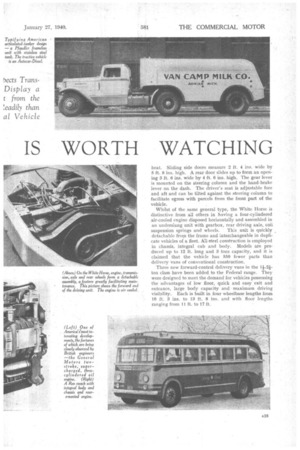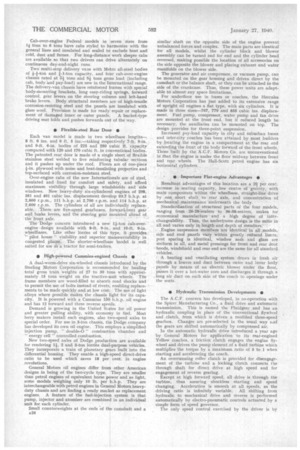Is Co-ordination Making Progress?
Page 27

Page 28

If you've noticed an error in this article please click here to report it so we can fix it.
Road Transport is Giving the Railway Companies an Opportunity to Play the Game
LTHOUGH it is difficult
to say anything very definite regarding the road and rail position until the Report of the Transport Advisory Council be issued, there are hopeful signs that some measure of co-ordination of these two vitally important means for transport is being achieved.
In our view, the major factor to take into consideration is that it is preferable for the arrangements to be made on a more or less friendly basis rather than for road transport to stand completely aloof and await action by the Minister.
We all know the danger lying in an Act of Parliament which endeavours to cover a wide scope, particularly if this takes the form of panic legislation. We believe that the railways have virtually failed to influence public opinion to any really important extent by their " square deal" campaign; in fact, it is thought in some quarters that this has given road transport more publicity and more favourable consideration than would otherwise have been the case. Consequently, it may well be that the railways are now more amenable to suggestions which have in view the prevention of a road-rail rate war, which would undoubtedly, prove harmful to both sides.
The Danger of Panic Legislation.
Perhaps the most important point now is to prevent the too rapid introduction of the anticipated Bill. Following the T.A.C. Report, ample time should be allowed for this to receive mature consideration; therefore, the Report should be made public as soon as possible. At the same time, the T.A.C. itself should not be rushed. We do not envy the Council its task, and it is essential that it should give due consideration to every aspect of the subject.
As announced in this journal, there have been several informal meetings between the Liaison Sub-committee and the railway managers. It is quite possible that a joint memorandum formulated by the four railways concerned and the LiaiSon Cominittee on Road Transport Rates, particularly in connection with the subject of rates, may be submitted to the T.A.C., and it is believed that a Draft Bill has already been prepared.
Some of the important sections amongst the haulage interests are of the opinion that agreements on rates between road and rail should be arranged district by district, route by route, and that the whole scheme should then be placed before an independent tribunal which would have the power to govern the rates for both sides.
Rate Control Should Afford Elasticay.
The problem of rate control is, as has been admitted by all sides, one of extreme difficulty, and not a question which can be arbitrarily answered by a rigid structure entorced by an Act. There are bound to be points which will involve much labour before a satisfactory agreement can be achieved. Not the least in this respect will be the opinions of, the various Niarketing Boards, the policy of which, hitherto, in so far as roadtransport rates are concerned, has not altogether redounded to their credit. In all these matters it is, and will remain, essential to take into consideration the views of trade and industry.
Road transport does not wish to make an excessive profit, but it does ask for reasonable rates which will give a fair return to those who ha,ve to depend upon the industry for their livelihood. Traders might benefit for a time by the prevalence of low charges for transport, but, in the nature of things, this state of• affairs could not last indefinitely, and the service rendered would be certain to -deteriorate. The essentials are high grade and efficient vehicles, well maintained, and manned by experienced and satisfied personnel able to perform their duties with reliability, speed and punctuality.
The railways must desire these same conditions, and no one in road transport wishes them to have less, provided that they be not achieved at the expense of the road interests.
It has been stated that the railways do not wish to interfere with the operation of ancillary trans port; in fact, part of their case is that users in this class will be in a position to exercise a certain amount of control by the mere fact of their independence. It has also been suggested that they have no idea of forcing traders to employ any particular form of transport. Whether this be true or not we shall no doubt ascertain when we learn the terms of the suggested Bill.
There are people in road transport who are extremely dubious as to the advisability of collaborating in any way with the railways. We consider that this attitude of isolation is, at this juncture of affairs, quite an erroneous one, for, as we have stated above, some degree of voluntary co-ordination is likely to be more beneficial than a measure which might be forced upon us. At the same time, it is vital to our interests that we maintain a powerful front. In other words, it must be a matter of give and take —not, so far as we are concerned, all give. What we all desire and hope for are stability and the right to progress and expand as the demand justifies.
On With the Farce !
WHILST we are, and always have been, strongly in favour of preventing wasteful competition in the road-transport industry, there have unquestionably been numerous instances where operators have been unfairly penalized. A case in point is that concerning Surrey Motors, Ltd., of Sutton, Surrey, which, for the past two years, has sought to operate an express service to Clacton-on-Sea. In full justice to the Metropolitan Traffic Commissioner, it must be mentioned that the licence was granted, the Commissioner expressing the view that the residents in an area so large as Sutton should not be deprived of such facilities as this operator was prepared to offer. The applicant is the sole operator in Sutton, and although such a service clearly could not be termed wasteful, and was not in direct competition with any other form of transport, the application was opposed by two other coach operators in a neighbouring area, the railway companies, London Transport and the Eastern National Omnibus Co., Ltd.
This opposition was so strong that the case was heard all over again by the Eastern Commissioners, on January 26, 1938, the result being that the Metropolitan Commissioner was ordered by the Minister of Transport to revoke the licence.
Appeals to the Minister occupied five full days, the appellants took over three days to criticize and oppose the Metropolitan Commissioners' decision, and Surrey Motors, Ltd., put up a defence which lasted for more than two days.
Despite the fact that the company was granted its licence it was called upon to pay a share of the costs incurred by the Minister in connection with the inquiry.
If the story ended here it would not be so bad but, as reported in our issue for last week, the company has again been successful in getting a licence from the Metropolitan Commissioner for the same service, but it is still faced with the possibility of not obtaining the necessary backing in the Eastern area.
How much longer is this operating company to wait before it is allowed to institute a service for which it obviously has a demand in an area from which no other operator has a starting point?
How much longer are objectors, whose facilities are not adequate, to be allowed to fight such cases on a monopolistic policy? As to the final outcome of this operator's efforts to supply a public demand, we can only hope that it will, in the end, be suc9essful, but it is little short of a scandal that it shOuld be put to so much expense, both direct and indirect, in order to improve its facilities.




















































































